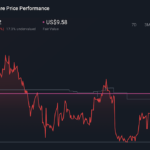
Salesforce.com Inc.’s fraught acquisition of Salesforce.org will force an estimated $200 million profit hit, but the transaction — which also involved another deal for a company Salesforce Ventures invested in — could produce “ghost revenue” the company can use to meet executive bonus targets.
Salesforce CRM, -1.04% the cloud-based customer relationship management, or CRM, software company, announced the deal last week but said little about the charge, which it called a “one-time non-cash accounting charge” estimated at $200 million, with a final amount to be determined and recognized at the closing of the transaction.
The charge is an operating expense for both the company’s standard financial reporting, according to GAAP, and for any non-GAAP results. On a conference call, executives said that it results from the termination of the current reseller agreement between Salesforce and Salesforce.org.
Opinion: Salesforce.com buys Salesforce.org, and that’s the only straightforward part
Salesforce, the for-profit company, provided free or deeply discounted software for the nonprofit and education customers of Salesforce.org via a reseller agreement between the two companies. The Salesforce.org customers also purchased minimum one-year support contracts directly from Salesforce. Salesforce says it will now service the Salesforce.org customers via a new business unit responsible for the sales, marketing and customer service of its software to the nonprofit and education communities.
A company spokeswoman gave MarketWatch the same explanation for the charge as provided in the press release, but also provided a reference to the applicable accounting standard, one that addresses how to account for the settlement of preexisting relationships between an acquirer and a target company.
According to that accounting rule, Salesforce must recognize a loss for a preexisting contractual relationship such as the reseller agreement, if, from the perspective of Salesforce, the contract is unfavorable when compared with pricing for current market transactions for the same or similar products and services. Salesforce will also consider whether the reseller contract contained any settlement provisions before finalizing the loss it will record when the deal closes.
“According to the accounting standards, the $200 million writedown is a separate transaction from the business combination and will reduce the value assigned to Salesforce.org on the parent company financial statements to $100 million,” Paul Chaney, a professor of accounting at Vanderbilt University told MarketWatch. “The irony is that if the reseller contract termination was not recognized by Salesforce.com, then the $200 million most likely would have ended up as goodwill, a premium paid for Salesforce.org, on the balance sheet. Terminating the contract thus reduces the disclosure of potential goodwill on Salesforce.com’s books.”
Also read: Earnings surprises are bigger, thanks to growing use of non-GAAP metrics
Salesforce.com also said in its news release it plans to pay a one-time cash purchase price of $300 million for all shares of Salesforce.org. The purchase price will go to the Salesforce Foundation, a California nonprofit public benefit corporation and federal tax-exempt charity, that shared an address — 50 Fremont St, Suite 300 in San Francisco —and two directors with Salesforce.org, according to filings by both organizations with the IRS.
Salesforce co-Chief Executive and chairman Marc Benioff is also chairman of Salesforce.org and the company’s charitable foundation, and was not on the conference call to discuss the deal nor quoted in the news release.
Adding to the Salesforce soup in this transaction is an earlier acquisition by Salesforce.org of a strategic partner and Salesforce investment. On January 14, 2019, Salesforce.org announced the acquisition of roundCorner, its primary strategic partner in implementing the Salesforce CRM software at nonprofit customers in North America. According to the website for Salesforce Ventures, Salesforce.com’s venture capital investment arm, roundCorner was a Salesforce Ventures portfolio company. The purchase price, source of funds for Salesforce.org and terms of the sale were not made public and were not disclosed by Salesforce in its annual report, since Salesforce.org was a separate organization at that time.
The Salesforce spokeswoman declined to provide the purchase price or terms for the roundCorner acquisition. Matt Garratt, the managing partner of Salesforce Ventures, did not respond to a request for comment.
The Contributor Development Partnership, a Boston-based collaborative fundraising service for public media stations, was a seed investor and board participant in roundCorner from its founding. A spokeswoman for CDP declined to provide any more details of the transaction between roundCorner and Salesforce.org.
Chaney told MarketWatch that if Salesforce.org paid a premium for roundCorner, any goodwill recorded in that acquisition won’t get carried over to the books of Salesforce.com.
“Why does this matter?” Chaney asked. “Since Salesforce.com was a venture investor in roundCorner, any overpayment for roundCorner benefits its investors, including Salesforce.com. Evidence for any potential overpayments disappear with this latest transaction.”
When firms are reluctant or unwilling to disclose relevant facts, Chaney told MarketWatch, “it may give the impression that they are hiding important events from investors.”
When firms are reluctant or unwilling to disclose relevant facts, Chaney told MarketWatch, “it may give the impression that they are hiding important events from investors.”
One upside for Salesforce of the acquisition of Salesforce.org is that it can take advantage of the full value of Salesforce.org’s deferred revenues — revenue that was collected in advance of services provided— on a non-GAAP basis, even though it will be forced to write them down for GAAP reporting purposes as a result of the acquisition. The revenue writedowns, called “deferred revenue purchase accounting adjustments,” are required by GAAP and can become “ghost revenue” for the acquiring company.
See also: Companies including Symantec are using ‘ghost revenue’ to calculate bonuses
Companies complain the revenue write-downs affect comparability and result in numbers that are not representative of what they would have produced if GAAP rules didn’t make them eliminate the revenue forever. Since they will never be recognized under GAAP, companies instead create a “cookie jar” of revenue that can be recognized using non-GAAP metrics any time the company needs a boost to meet earnings estimates or to hit executive compensation targets.
Companies such as Broadcom Inc. AVGO, -0.42% , Norwegian Cruise Line Holdings Ltd. NCLH, -0.56% , and Symantec Corp. SYMC, -0.16% have reportedly been adding them back to GAAP revenue numbers on an adjusted basis.
The technique raised questions after a former Symantec employee complained about the practice internally and prompted an audit committee investigation in May 2018 into “the company’s public disclosures including commentary on historical financial results, its reporting of certain non-GAAP measures including those that could impact executive compensation programs, certain forward-looking statements, stock trading plans and retaliation.”
Read: Here’s one way to tell if a company is overpaying its CEO
Salesforce has frequently converted GAAP losses to profits to achieve executive-compensation targets in the past. The company reported losses every year from 2011 through 2015, and yet its CEO compensation exceeded one research study’s expected compensation by more than $5 million each year, according to a MarketWatch report.







